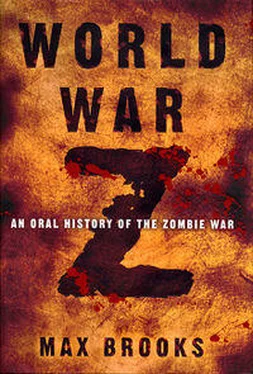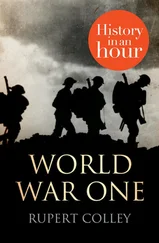[I kneel to examine the bone pile. They have all been broken, the marrow extracted.]
Winter really hit us in early December. The snow was over our heads, literally, mountains of it, thick and gray from the pollution. The camp got silent. No more fights, no more shooting. By Christmas Day there was plenty of food.
[She holds up what looks like a miniature femur. It has been scraped clean by a knife.]
They say eleven million people died that winter, and that’s just in North America. That doesn’t count the other places: Greenland, Iceland, Scandinavia. I don’t want to think about Siberia, all those refugees from southern China, the ones from Japan who’d never been outside a city, and all those poor people from India. That was the first Gray Winter, when the filth in the sky started changing the weather. They say that a part of that filth, I don’t know how much, was ash from human remains.
[She plants a marker above the pit.]
It took a lot of time, but eventually the sun did come out, the weather began to warm, the snow finally began to melt. By mid-July, spring was finally here, and so were the living dead.
[One of the other team members calls us over. A zombie is half buried, frozen from the waist down in the ice. The head, arms, and upper torso are very much alive, thrashing and moaning, and trying to claw toward us.]
Why do they come back after freezing? All human cells contain water, right? And when that water freezes, it expands and bursts the cell walls. That’s why you can’t just freeze people in suspended animation, so then why does it work for the living dead?
[The zombie makes one great lunge in our direction; its frozen lower torso begins to snap. Jesika raises her weapon, a long iron crowbar, and casually smashes the creature’s skull.]
Udaipur Lake Palace, Lake Pichola, Rajasthan, India
[Completely covering its foundation of lagniwas Island, this idyllic, almost fairy-tale structure was once a maharaja’s residence, then a luxury hotel, then a haven to several hundred refugees, until an outbreak of cholera killed them all. Under the direction of Project Manager Sardar Khan, the hotel, like the lake and surrounding city, is finally beginning to return to life. During his recollections. Mister Khan sounds less like a battle-hardened, highly educated civilian engineer, and more like a young, frightened lance corporal who once found himself on a chaotic mountain road.]
I remember the monkeys, hundreds of them, climbing and skittering among the vehicles, even over the tops of people’s heads. I’d watched them as far back as Chandigarh, leaping from roofs and balconies as the living dead filled the street. I remember them scattering, chattering, scrambling straight up telephone poles to escape the zombies’ grasping arms. Some didn’t even wait to be attacked; they knew. And now they were here, on this narrow, twisting Himalayan goat track. They called it a road, but even in peacetime it had been a notorious death trap. Thousands of refugees were streaming past, or climbing over the stalled and abandoned vehicles. People were still trying to struggle with suitcases, boxes; one man was stubbornly holding on to the monitor for a desktop PC. A monkey landed on his head, trying to use it as a stepping-stone, but the man was too close to the edge and the two of them went tumbling over the side. It seemed like every second someone would lose their footing. There were just too many people. The road didn’t even have a guardrail. I saw a whole bus go over, I don’t even know how, it wasn’t even moving. Passengers were climbing out of the windows because the doors of the bus had been jammed by foot traffic. One woman was halfway out the window when the bus tipped over. Some-thing was in her arms, something clutched tightly to her. I tell myself that it wasn’t moving, or crying, that it was just a bundle of clothes. No one within arm’s reach tried to help her. No one even looked, they just kept streaming by. Sometimes when I dream about that moment, I can’t tell the difference between them and the monkeys.
I wasn’t supposed to be there, I wasn’t even a combat engineer. I was with the BRO ; my job was to build roads, not blow them up. I’d just been wandering through the assembly area at Shimla, trying to find what re-mained of my unit, when this engineer, Sergeant Mukherjee, grabbed me by the arm and said, “You, soldier, you know how to drive?”
I think I stammered something to the affirmative, and suddenly he was shoving me into the driver’s side of a jeep while he jumped in next to me with some kind of radiolike device on his lap. “Get back to the pass! Go! Go!” I took off down the road, screeching and skidding and crying desperately to explain that I was actually a steamroller driver, and not even fully qualified at that. Mukherjee didn’t hear me. He was too busy fiddling with the device on his lap. “The charges are already set,” he explained. “All we have to do is wait for the order!”
“What charges?” I asked. “What order?”
“To blow the pass, you arse head!” he yelled, motioning to what I now-recognized as a detonator on his lap. “How the hell else are we going to stop them’”
I knew, vaguely, that our retreat into the Himalayas had something to do with some kind of master plan, and that part of that plan meant closing all the mountain passes to the living dead. I never dreamed, however, that I would be such a vital participant! For the sake of civil conversation, I will not repeat my profane reaction to Mukherjee, nor Mukherjee’s equally profane reaction when we arrived at the pass and found it still full of refugees.
“It’s supposed to be clear!” he shouted. “No more refugees!”
We noticed a soldier from the Rashtriya Rifles, the outfit that was supposed to be securing the road’s mountain entrance, come running past the jeep. Mukherjee jumped out and grabbed the man. “What the hell is this?” he asked; he was a big man, tough and angry. “You were supposed to keep the road clear.” The other man was just as angry, just as scared. “You want to shoot your grandmother, go ahead!” He shoved the sergeant aside and kept going.
Mukherjee keyed his radio and reported that the road was still highly active. A voice came back to him, a high-pitched, frantic younger voice of an officer screaming that his orders were to blow the road no matter how-many people were on it. Mukherjee responded angrily that he had to wait till it was clear. If we blew it now, not only would we be sending dozens of people hurtling to their deaths, but we would be trapping thousands on the other side. The voice shot back that the road would never be clear, that the only thing behind those people was a raging swarm of God knows how-many million zombies. Mukherjee answered that he would blow it when the zombies got here, and not a second before. He wasn’t about to commit murder no matter what some pissant lieutenant…
But then Mukherjee stopped in midsentence and looked at something over my head. I whipped around, and suddenly found myself staring into the face of General Raj’Singh! I don’t know where he came from, why he was there … to this day no one believes me, not that he wasn’t there, but that I was. I was inches away from him, from the Tiger of Delhi! I’ve heard that people tend to view those they respect as appearing physically taller than they actually are. In my mind, he appears as a virtual giant. Even with his torn uniform, his bloody turban, the patch on his right eye and the bandage on his nose (one of his men had smashed him in the face to get him on the last chopper out of Gandhi Park). General Raj-Singh…
[Khan takes a deep breath, his chest filling with pride.]
“Gentlemen,” he began … he called us “Gentlemen” and explained, very carefully, that the road had to be destroyed immediately. The air force, what was left of it, had its own orders concerning the closure of all mountain passes. At this moment, a single Shamsher fighter bomber was already on station above our position. If we found ourselves unable, or unwilling, to accomplish our mission, then the Jaguar’s pilot was ordered to execute “Shiva’s Wrath.” “Do you know what that means?” Raj-Singh asked. Maybe he thought I was too young to understand, or maybe he must have guessed, somehow, that I was Muslim, but even if I’d known absolutely nothing about the Hindu deity of destruction, everyone in uniform had heard rumors about the “secret” code name for the use of thermonuclear weapons.
Читать дальше












